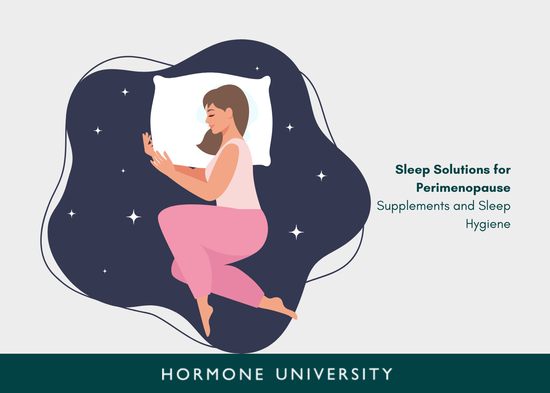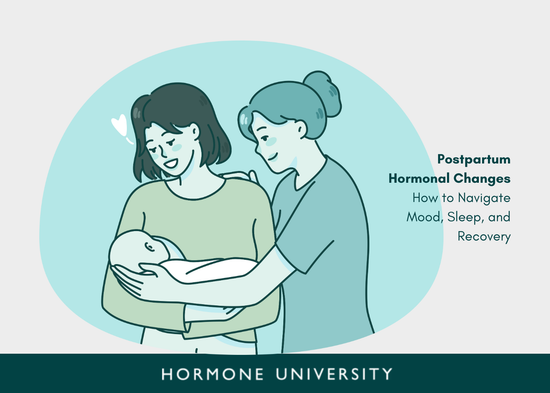The clock reads 3 a.m., and you’re wide awake. Again. Maybe a wave of intense heat jolted you from a deep sleep, or perhaps your mind is racing with a low hum of anxiety you just can’t seem to turn off. If you’re spending more time staring at the ceiling than you are sleeping, you are not alone. Perimenopause sleep problems are incredibly common, but that doesn't make the bone-deep exhaustion any less real. A good night's sleep can start to feel like a distant memory for so many women navigating this stage of life.
Here at Glow by Hormone University, our entire mission was born from a personal place. Our founder’s own difficult journey with hormonal health opened her eyes to how often women's very real symptoms are dismissed or misunderstood . We believe you deserve answers and solutions that work in harmony with your body. Restful sleep is not a luxury; a biological necessity. Let's walk through why your sleep is so disrupted and explore the powerful combination of sleep hygiene perimenopause practices and targeted supplements for sleep that can help you reclaim your nights.
Why is Sleep Disrupted in Perimenopause?
So, why is sleep suddenly so elusive? The answer lies in the hormonal rollercoaster of perimenopause. Two key hormones, estrogen and progesterone, begin to fluctuate and decline, and this directly impacts your ability to get quality rest.
- Progesterone: A hormone has a naturally calming, sleep-promoting effect on the brain. As your progesterone levels drop, you may find it much harder to fall asleep and stay asleep. A is a major contributor to perimenopause insomnia.
- Estrogen: A hormone helps regulate your body’s internal thermostat and plays a role in your mood. When estrogen levels become erratic, you can experience the hallmark symptom of menopause and insomnia: night sweats. A sudden, intense, drenching heat can easily wake you from a deep sleep. Low estrogen can also contribute to feelings of anxiety and depression, making it difficult for your mind to quiet down at night.
A combination of these hormonal shifts and the resulting sleep disturbances is the primary reason why so many women struggle with their sleep during this transition.
The Foundation: Why Sleep Hygiene Matters During Perimenopause
Before you reach for any sleep aid, building a strong foundation of healthy habits is crucial. Sleep hygiene refers to the set of practices and routines that signal to your brain that it’s time to wind down and prepare for rest. Good sleep hygiene for insomnia is about creating powerful, consistent cues for your body to follow.
Key Sleep Hygiene Practices:
-
A Consistent Schedule: Go to bed and wake up at roughly the same time every day, even on weekends. A regular schedule helps to regulate your body's internal clock, or circadian rhythm.
-
Mind Your Light Exposure: Get some natural sunlight first thing in the morning to signal to your brain that it's daytime. In the evening, dim the lights in your home and avoid the blue light from screens (phones, tablets, TVs) for at least an hour before bed.
-
Watch What You Consume: Avoid caffeine after noon and limit alcohol in the evening. While a glass of wine might make you feel sleepy initially, alcohol disrupts sleep quality in the second half of the night, often causing you to wake up.
How to Cool Down Night Sweats Naturally
Your bedroom should be a sanctuary for sleep. Keep it cool, dark, and quiet. A cool room is especially important for getting hot flash nighttime relief. If night sweats are a major issue, consider using our All-Natural Flaxseed and Lavender Pad. You can chill it in the freezer for a few hours and place it on your chest or behind your neck for instant cooling comfort when a hot flash strikes . The calming scent of lavender also adds a layer of aromatherapy, helping to relax your mind as your body cools down .
Which Supplements Help Perimenopause Insomnia?
Once your sleep hygiene perimenopause practices are in place, targeted sleep supplements can provide powerful additional support.
Can Magnesium Improve Sleep Quality? The Unsung Hero
If you try one natural sleep supplement, make it magnesium. A mineral is a powerhouse for relaxation, yet many of us are deficient. The connection between magnesium and sleep is profound; the mineral helps calm the nervous system by supporting the production of GABA, a neurotransmitter that promotes rest. A good magnesium supplement can ease muscle tension, quiet a racing mind, and help with the restless legs that can plague perimenopausal women.
When it comes to magnesium supplements for sleep, not all forms are created equal. Oral supplements can sometimes cause digestive upset, which is the last thing you need when you're already feeling off . A is why a topical cream is one of the best supplements for sleep. Our Super Rich Magnesium Body Lotion uses pure Zechstein magnesium, which is absorbed directly through the skin, bypassing the gut entirely . A method allows for fast, effective absorption without any digestive side effects . As one user raved, it's the "Best Magnesium Cream Ever" for reducing muscle tension and helping with sleep .
Finding Effective Melatonin Alternatives
Melatonin supplements for sleep are popular because melatonin is the hormone your body naturally produces to regulate your sleep-wake cycle. A supplement can be helpful for resetting your internal clock if you have jet lag, but for many women experiencing perimenopause sleep problems, the issue isn't a lack of melatonin but an overactive stress response or disruptive hot flashes. In these cases, calming agents like magnesium or hormone-balancing botanicals often work as more effective melatonin alternatives.
Addressing the Root Cause: Hormonal Support for Night Sweats
If hot flashes are the main reason you're waking up, the most effective insomnia treatment is to address the hot flashes themselves. Our Menopause SOS Cream is a natural sleep aid that works on the root cause. A formula uses botanicals like Wild Yam, which can mimic estrogen activity, and Vitex to help balance hormones, effectively reducing the frequency and intensity of night sweats and hot flashes . Many women find that when the night sweats subside, their sleep naturally and dramatically improves .
What Bedtime Routine Aids Hormone-Related Insomnia?
Creating a consistent, calming bedtime routine is one of the most powerful things you can do. A routine reinforces your sleep hygiene and prepares your mind and body for rest.
- Step 1: Wind Down (1 Hour Before Bed): Dim the lights and put away all screens. Make a cup of caffeine-free herbal tea.
- Step 2: Calm the Body (30 Minutes Before Bed): Take a warm bath or shower. Afterwards, as you're getting ready for bed, apply the Menopause SOS Cream to your inner thighs to help keep night sweats at bay .
- Step 3: Relax the Nerves (15 Minutes Before Bed): Massage the Super Rich Magnesium Body Lotion into your arms, legs, and shoulders. The physical act of massage is relaxing, and the magnesium will begin to work its calming magic .
- Step 4: Set the Environment (Time for Bed): Get into your cool, dark bedroom. If you feel a hot flash coming on, grab your chilled All-Natural Flaxseed and Lavender Pad .
- Step 5: Quiet the Mind: Do a few minutes of gentle stretching or deep breathing exercises once you're in bed.
For a comprehensive approach, our Menopause Care Essentials bundle combines our two most powerful menopause insomnia remedies: the Menopause SOS Cream to tackle hot flashes and the Super Rich Magnesium Body Lotion to calm the nervous system . A duo offers a powerful strategy for tackling menopause sleeplessness from every angle.
Frequently Asked Questions
Q: What's the difference between perimenopause insomnia and regular insomnia?
While both involve difficulty sleeping, perimenopause insomnia is specifically driven by hormonal fluctuations. The primary culprits are often disruptive physical symptoms like night sweats and a new, underlying sense of anxiety, both linked to declining estrogen and progesterone.
Q: Can I become dependent on natural sleep aids?
Supplements like magnesium are minerals your body needs and are not considered addictive. Most herbal sleep aids are also non-habit-forming. It's always a good practice to listen to your body and consult your healthcare provider.
Q: Why is topical magnesium better for sleep support?
Topical magnesium, like our Super Rich Magnesium Body Lotion, is absorbed directly through the skin. A method bypasses the digestive tract, avoiding the potential laxative effects of some oral supplements and delivering the mineral right to your system for fast-acting relaxation .
Q: Will these sleep solutions make me groggy in the morning?
Unlike some prescription sleep medications, these supplements for sleep are designed to support your body's natural sleep processes. Magnesium and hormone-balancing creams work to calm your system and reduce disruptions, helping you wake up feeling refreshed, not groggy.
Q: How long until I see results?
Improving your sleep hygiene can bring benefits almost immediately. For supplements for insomnia that work on hormonal balance, like our Menopause SOS Cream, consistency is key. Many women report noticeable improvements in their sleep and other symptoms within a few weeks of daily use .
You do not have to accept exhaustion as your new normal. A combination of consistent sleep hygiene, targeted sleep supplements like magnesium, and addressing the root hormonal causes of your symptoms can pave the way for deep, restorative rest. You deserve to wake up feeling refreshed and ready to take on your day.





